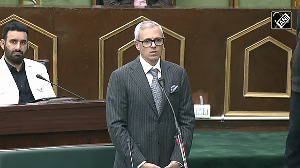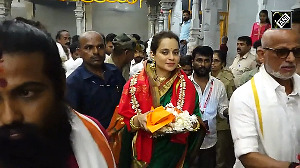
The Delhi high court on Monday freed Gautam Navlakha from house arrest, five weeks after he and four other rights activists were arrested in connection with the Koregaon-Bhima violence in Maharashtra.
Granting relief to Navlakha, the high court also quashed the trial court's transit remand order which he had challenged before the matter was taken to the Supreme Court.
The high court refused to accept the submission of Maharashtra government that his house arrest be extended by two days since the apex court, by its last week verdict, had also extended it by four weeks.
A bench of Justices S Muralidhar and Vinod Goel said the apex court had extended the house arrest by four weeks to enable the activists to avail appropriate legal remedy and the extension was for this limited purpose and Navlakha has availed it.
Setting aside the August 28 order of chief metropolitan magistrate granting Navlakha's transit remand to Pune Police, it said there was non-compliance of basic provisions of the Constitution and the CrPC which were mandatory in nature.
Holding that the trial court order was unsustainable in law, the court said Navlakha's detention has exceeded 24 hours which was "untenable".
"In view of Section 56 read with Section 57 of the CrPC and absence of remand order of the CMM, the detention of the petitioner has clearly exceeded 24 hours which is untenable in law. Consequently the house arrest of the petitioner comes to an end now," the court said allowing the petition filed on behalf of Navlakha challenging his arrest and the transit remand order of the trial court.
The court made it clear that this order will not preclude the state of Maharashtra from proceeding further.
After the court's order, Navlakha said, "It thrills me no end."
Navlakha added that he cannot forget about his co-accused and the tens of thousands of other political prisoners who remain incarcerated for their ideological convictions on account of false charges filed against them.
"The period of house arrest, despite the restrictions imposed, was put to good use, so I hold no grudge," Navlakha, under house arrest since August 28, said in a statement.
Navlakha was arrested from the national capital on August 28. The other four activists were arrested from different parts of the country.
The Maharashtra police had arrested the activists on August 28 in connection with an FIR lodged following a conclave -- 'Elgaar Parishad' -- held on December 31 last year that had allegedly triggered violence later at Koregaon-Bhima village in the state.
While setting aside the trial court's order, the bench said the CMM has overlooked that under the provisions of the Constitution, the arrested person has to be given grounds of arrest and mere intimation of arrest to his partner or friend will not suffice.
The court said that in the transit remand order, the CMM has noted the submissions of the investigating officer of the case but the magistrate did not think it necessary to record the submissions of the legal aid counsel, who was provided to Navlakha.
The bench said the appearance of the legal aid counsel was "cosmetic" and not in true spirit of Article 21 and the provision of the Legal Services Authority Act.
The court said there was no indication in the trial court order that it asked the IO to show the case diary or saw the case diary.
The bench noted that when the case had come up before it initially the case diary and relevant documents were in Marathi language and they were not translated.
"In all probabilities when the IO appeared before the CMM, the case diary was in Marathi and if he (CMM) had asked for case diary, he would not have understood it," it noted.
In the Koregaon-Bhima case, the five activists -- Varavara Rao, Arun Ferreira, Vernon Gonsalves, Sudha Bharadwaj and Gautam Navlakha -- were put under house arrest on August 29 following an apex court order on the plea by historian Romila Thapar, economists Prabhat Patnaik and Devaki Jain, sociology professor Satish Deshpande and human rights lawyer Maja Daruwala against the police action.
Rao, a prominent Telugu poet, was arrested on August 28 from Hyderabad, while Gonsalves and Ferreira were nabbed from Mumbai. Bharadwaj was arrrested from Faridabad in Haryana.
During the hearing, advocate Nitya Ramakrishnan, appearing for Navlakha, argued that the transit remand should be quashed as the CMM could not have understood any documents being written in Marathi and no case diary was provided to the trial court as mandated under the statute.
She contended that the FIR was lodged in January this year and the activists were arrested in August 2018, there was no hurry and the police could have got the documents translated.
When the bench said Navlakha's detention was for more than 15 days which was not permissible, the counsel for the Maharashtra government said it was under the orders of the Supreme Court and not the magistrate.
The counsel also read out portions of the apex court's September 28 verdict by which it had refused to interfere with the arrest of the five rights activists and had also refused the plea seeking their immediate release.
While hearing the submissions, the bench also referred to the recent verdict of the Supreme Court which has ordered the Kerala government to pay Rs 50 lakh compensation to former ISRO scientist S Nambi Narayanan in the 1994 espionage case for wrongful imprisonment, malicious prosecution, humiliation and defamation.
The apex court has asked a former SC judge to find ways and means to take action against the erring police officers responsible for Narayanan's arrest and harassment.











 © 2025
© 2025